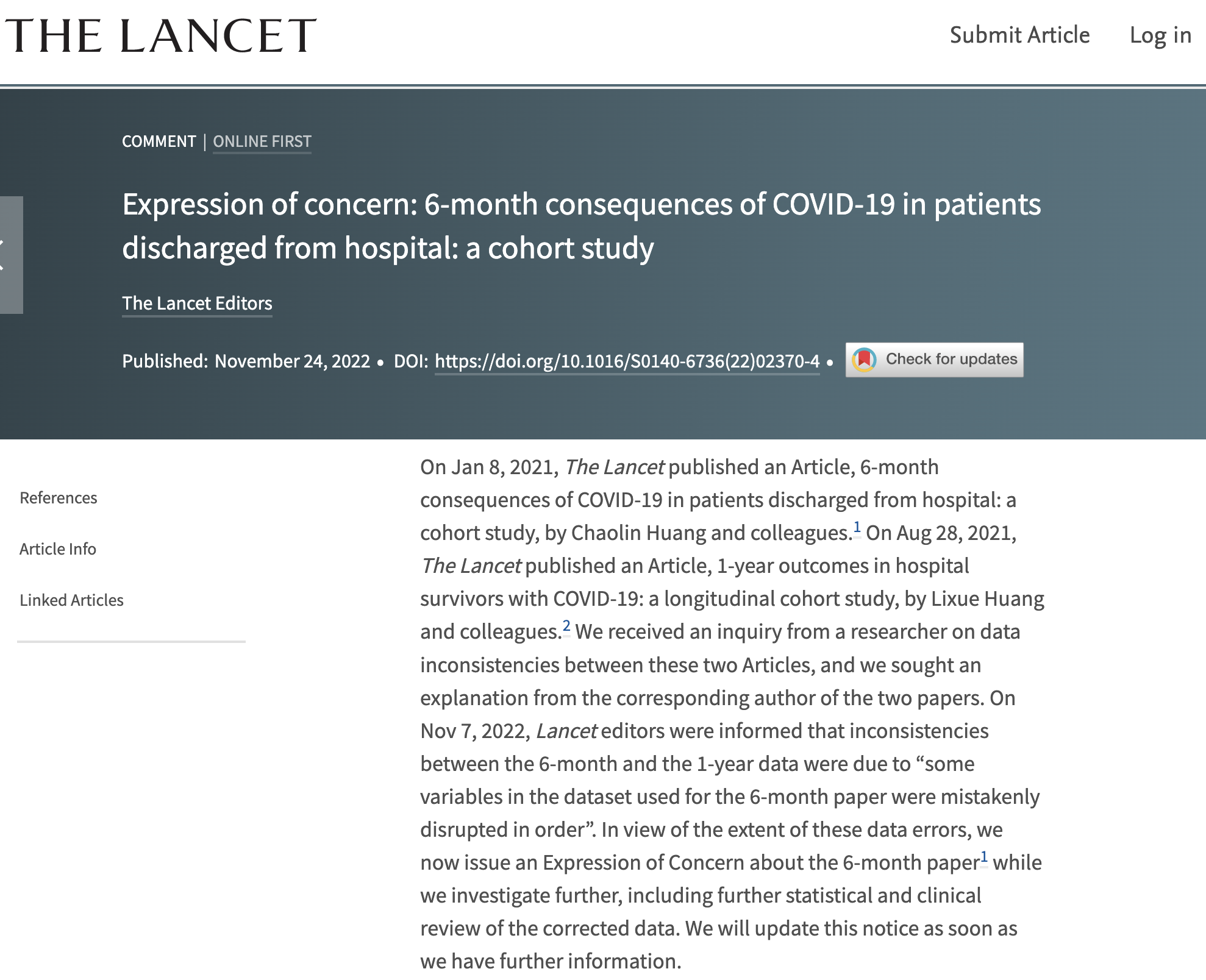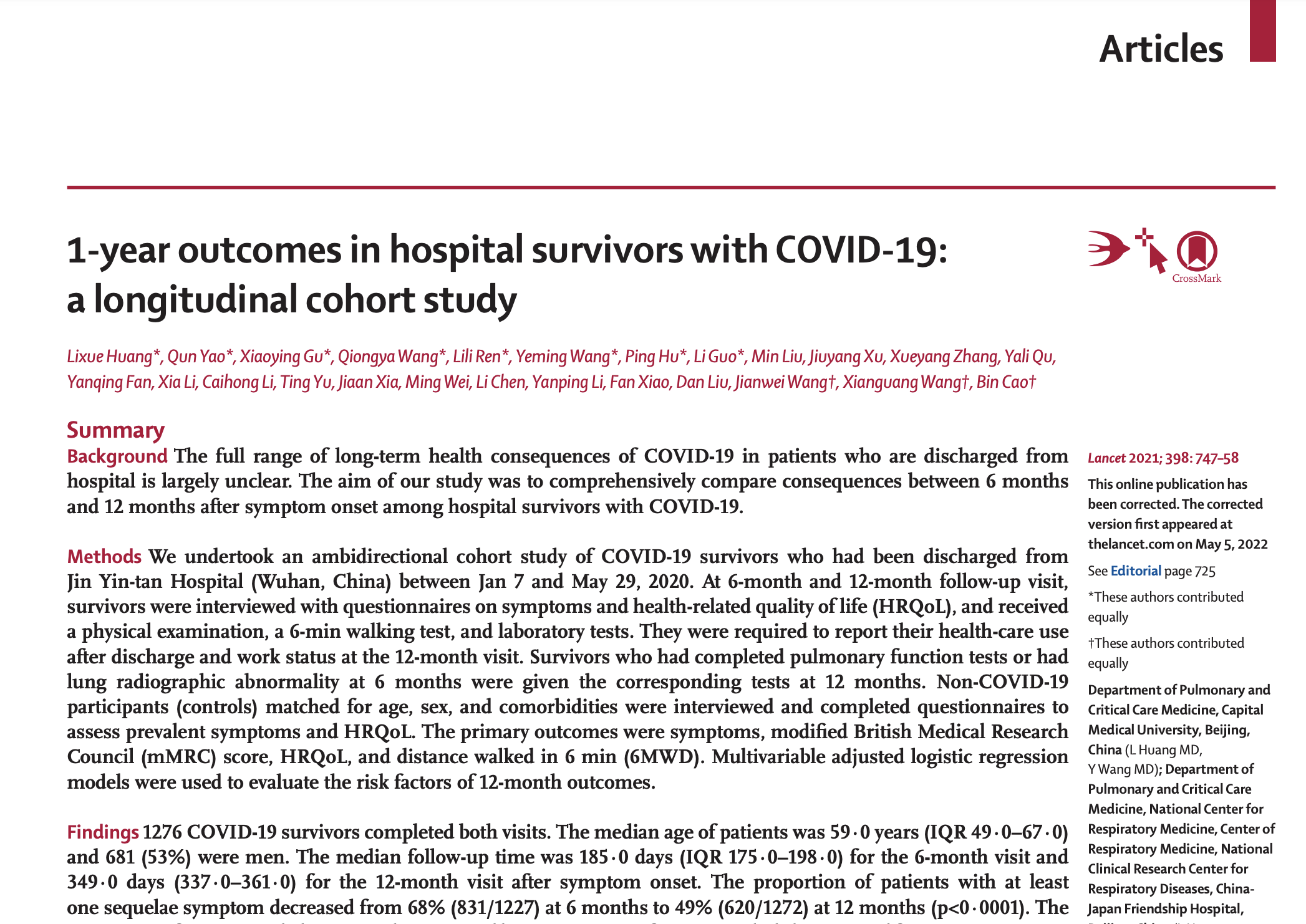
On November 24, 2022, the editorial board of The Lancet, an international medical journal, interviewed Zhang Dingyu, former president of Wuhan Jinyintan Hospital in Hubei Province, Professor Wang Jianwei, vice president of Chinese Academy of Medical Sciences and Peking Union Medical College, and Sino-Japanese friendship. Professor Cao Bin, vice president of the hospital, and others issued a statement of concern on a research paper on "the long-term impact of new coronary pneumonia on the health of patients" (or the impact of long-term outcomes, the long-term health consequences of patients with COVID-19) (Expression of concern).
The paper disclosed the results of a centralized follow-up study completed from June to September of that year on 1,733 patients who were discharged from Wuhan Jinyintan Hospital from January 7 to May 29, 2020. The paper found that more than three-quarters of COVID-19 patients (covid-19 patients) reported at least one symptom, such as fatigue or muscle weakness, six months after onset.
The above statement of concern from the editorial department of The Lancet stated that after questioning the corresponding author, the editorial department of The Lancet was informed on November 7, 2022 that "some variables in the data set used in the involved papers were incorrectly Disrupted order" (some variables in the dataset used for the 6-month paper were mistakenly disrupted in order). "Given the extent to which these data were inaccurate, we are now issuing a statement of concern about the '6 month' paper, while further investigation will include further statistical and clinical review of the corrected data."

On November 24, 2022, a statement of concern issued by the editorial board of the international medical journal The Lancet.
The title of the paper involved is "6-month consequences of COVID-19 in patients discharged from hospital: a cohort study" (6-month consequences of COVID-19 in patients discharged from hospital: a cohort study) (hereinafter referred to as "6-month papers") ”), Published online in The Lancet, 8 January 2021.
The paper shows that Cao Bin, Zhang Dingyu and Wang Jianwei contributed equally. Cao Bin is the corresponding author marked in the paper.
Among them, Cao Bin’s signatories include China-Japan Friendship Hospital, Department of Respiratory and Critical Care Medicine, National Clinical Research Center for Respiratory Diseases, and National Center for Respiratory Medicine.
According to information released on the relevant website of the China-Japan Friendship Hospital on January 11, 2021, the above-mentioned research was jointly completed by Wuhan Jinyintan Hospital, the Respiratory Center of the China-Japan Friendship Hospital, the National Center for Respiratory Medicine, and the Institute of Pathogen Biology, Chinese Academy of Medical Sciences. Huang Chaolin, Huang Lixue, Wang Yeming, Li Xia, Ren Lili, Gu Xiaoying, Kang Liang, Guo Li and Liu Min are the co-first authors. The study assessed the impact of COVID-19 on long-term patient outcomes. "The study found that 76% of patients (more than three-quarters) still had at least one persistent symptom six months after onset. Fatigue, muscle weakness were the most common symptoms, and sleep disturbances, anxiety and depression were also frequent. "
"Professor Cao Bin of the National Center for Respiratory Medicine, China-Japan Friendship Hospital and Capital Medical University said: 'Because COVID-19 is an emerging disease, we are only just beginning to understand its long-term impact on patients' health. Our follow-up study suggest that most patients continue to be at least partially affected by the virus after discharge and that medical care after discharge is warranted, especially for patients who were more ill at the time of admission. Our study also suggests that in larger The importance of longer-term follow-up studies in the population in order to understand the full impact of the disease may be on the human body.' This follow-up study was completed between June 16 and September 3, 2020, and enrolled 7 January 2020 1,733 patients were discharged from Wuhan Jinyintan Hospital from May 29 to May 29. The median age of the patients was 57 years old, and the median follow-up time was 186 days after the onset of illness." According to the above information on the relevant website of the China-Japan Friendship Hospital.

The Lancet editorial board is concerned about the article targeted by the statement. According to the paper, follow-up found that 76% of patients with new coronary pneumonia still had at least one persistent symptom 6 months after onset.
The above-mentioned papers are signed by Chaolin Huang, Lixue Huang, Yeming Wang, Xia Li, Lili Ren, Xiaoying Gu, Liang Kang, Li Guo, Min Liu, Xing Zhou, Jianfeng Luo, Zhenghui Huang, Shengjin Tu, Yue Zhao, Li Chen , Decui Xu, Yanping Li, Caihong Li, Lu Peng, Yong Li, Wuxiang Xie, Dan Cui, Lianhan Shang, Guohui Fan, Jiuyang Xu, Geng Wang, Ying Wang, Jingchuan Zhong, Chen Wang, Jianwei Wang (Wang Jianwei), Dingyu Zhang (Zhang Dingyu), Bin Cao (Cao Bin).
What is long-term symptoms of new crown (long COVID)?
About a month before the publication of the above paper, in December 2020, the international medical journal "The Lancet" published an editorial saying, "Facing the long-term symptom dilemma of the new crown", and said that at the end of November 2020, the 2020 "Lancet- At the Lancet–Chinese Academy of Medical Sciences conference, "Bin Cao presented the long-term outcome of COVID-19 patients in Wuhan (to be published in The Lancet) and warned against , dysfunction and complications in some discharged patients may persist for at least 6 months. What we call 'long COVID' (long COVID) is a rapidly evolving medical problem that requires action now."
Seven months after the publication of the above-mentioned papers involved, in August 2021, Cao Bin, Wang Jianwei and others published a study on the one-year follow-up of 1,276 patients previously discharged from Wuhan Jinyintan Hospital in The Lancet result. They found that "the proportion of patients who also had at least one sequelae symptom decreased from 68% (831/1227) at 6 months to 49% (620/1272) at 12 months (p<0.0001) .”
The title of the paper is "1-year outcomes in hospital survivors with COVID-19: a longitudinal cohort study" (hereinafter referred to as "1-year paper").

Results of a one-year follow-up study of 1276 discharged patients with new coronary pneumonia.
But the paper was corrected after it was first published. Its corrected version was first published on the Lancet website on 5 May 2022.
It is worth noting that the above-mentioned "6-month paper" mentioned that 6 months after the onset of new coronary pneumonia, the proportion of survivors reporting at least one symptom was 76% (1265 of 1655). However, the relevant proportion mentioned in the above "1-year papers" was 68% (831/1227). The Lancet has not disclosed whether the "data inconsistencies" mentioned in its statement of concern are related to this.
The above-mentioned statement of concern issued by the editorial department of The Lancet on November 24, 2022 stated, "After receiving an inquiry from a researcher about the data inconsistency between the two articles, we sought advice from the corresponding authors of the two articles. Interpretation. On 7 November 2022, The Lancet editorial board was informed that the inconsistency between the '6-month' and '1-year' data was due to 'some Variables were incorrectly shuffled'. Given the extent of these data errors, we are now issuing a statement of concern for the '6 month' paper while further investigation will include further statistical and clinical review of the corrected data. Updates are subject to availability We will update this notice as soon as we have more information."
In addition, on May 11, 2022, Cao Bin and Wang Jianwei, as co-corresponding authors, published a paper online in the international academic journal "The Lancet Respiratory Medicine" (The Lancet Respiratory Medicine), reporting on the novel coronavirus infection of Wuhan Jinyintan Hospital. Results of a two-year follow-up study of 1192 discharged patients with pneumonia.
According to the paper, from January 7 to May 29, 2020, 2469 patients with new coronary pneumonia were discharged from Wuhan Jinyintan Hospital. Of these, 1192 completed assessments at three follow-up visits and were included in the final analysis; 94%, or 1119, participated in a face-to-face interview two years after infection. Overall, patients who recovered from COVID-19 remained in poorer health than the general population two years after their first infection, meaning some patients took longer to fully recover. "The proportion of COVID-19 survivors who also had at least one sequelae symptom decreased significantly from 68% (77/1149) at 6 months to 55% (650/1190) at 2 years (p< 0.0001), fatigue or muscle weakness were the most common symptoms."
The title of the paper is "Health outcomes in people 2 years after surviving hospitalization with COVID-19: a longitudinal cohort study". The study was reported by the media as "the longest follow-up of the new crown in the world".

Results of a 2-year follow-up study of 1192 discharged patients with new coronary pneumonia.
In addition, according to the news released on the WeChat public account of The Lancet, on July 17, 2021, the journal published an observational study of more than 70,000 people in 302 hospitals in the UK, and found that every two hospitalized patients with COVID-19 One person will have at least one complication. "Professors Cao Bin and Gu Xiaoying from the China-Japan Friendship Hospital (who were not involved in the study) wrote in a related commentary: 'Considering the large number of SARS-CoV-2 infections worldwide, the acute phase of post-COVID-19 The public health implications are substantial. In addition to analyzing the multiple manifestations of the entire spectrum of clinical disease in the acute phase of post-COVID-19, further studies in populations with different demographic and clinical characteristics are needed to elucidate Especially the pathophysiological mechanism of long-term COVID-19. In addition, serological characteristics, and the impact of immune abnormalities and inflammatory damage caused by acute SARS-CoV-2 infection on post-acute or long-term COVID-19 need to be studied.'”
According to the official website of the China-Japan Friendship Hospital, Cao Bin, chief physician, professor, doctoral supervisor, specializes in the diagnosis and treatment of respiratory infections; he is currently the vice president of the China-Japan Friendship Hospital, the director of the Department of Respiratory and Critical Care Medicine and the Department of Respiratory and Critical Care Medicine Director of the Second Department (including clinical microbiology and infection laboratory, tuberculosis area), director of the Management Committee of the Institute of Clinical Medicine, executive deputy director of the National Center for Respiratory Medicine, deputy director of the Institute of Respiratory Diseases of the Chinese Academy of Medical Sciences; served as the "International Influenza and Member of Society of Respiratory Virus Infection (ISIRV), Associate Editor of Clinical Respiratory Journal, Member of Editorial Steering Committee of International Journal of Infectious Diseases, Corresponding Editor of Chinese Journal of Medicine and Chinese Journal of Tuberculosis and Respiratory.
According to the official website of Peking Union Medical College, Chinese Academy of Medical Sciences, Wang Jianwei, researcher, professor (long-term appointment), doctoral supervisor; since February 2006, he has successively served as an associate researcher at the Institute of Pathogen Biology, Peking Union Medical College, Chinese Academy of Medical Sciences (referred to as the institution) , researcher, professor (long-term employment), doctoral supervisor, director of Christopher Mérieux's laboratory, assistant to the director, deputy director, and director of the Science and Technology Management Office of the college. In June 2019, he served as the vice president and member of the Standing Committee of the Party Committee.
According to the above information, Wang Jianwei is mainly engaged in research on the pathogenic mechanism and prevention of important respiratory virus infections. He has received support from a number of talent plan projects. He is a member of the key special expert group of "key technology research and development"; he is an executive director of the sixth council of the Chinese Preventive Medicine Association and an executive editor of Biosafety & Health magazine.
